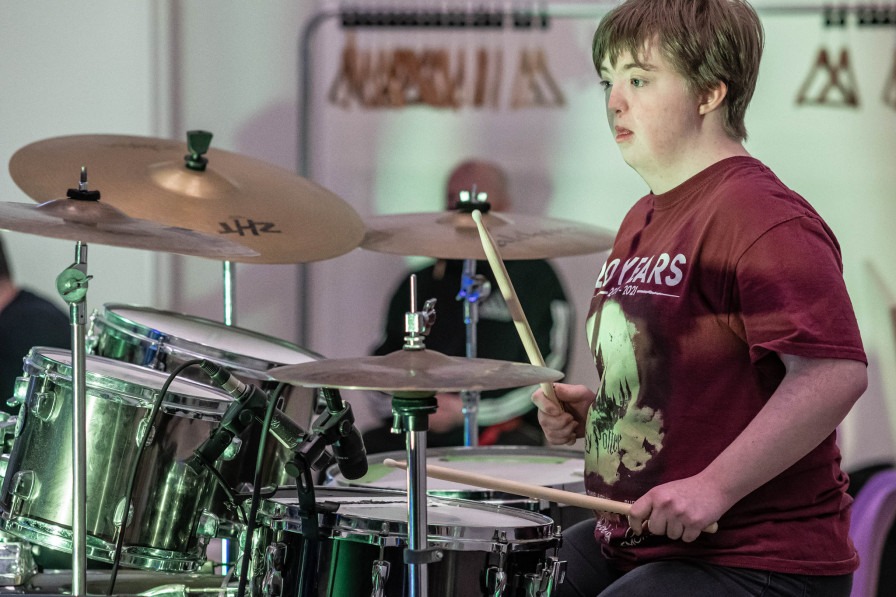National Plan for Music Education: false dawn or new hope?

National Plan for Music Education: false dawn or new hope?
In June 2022, the government published The power of music to change lives: a refreshed National Plan for Music Education. After ten years of campaigning for inclusion to be a prominent part of the plan, we were pleased to see progress such as:
- Babies and toddlers, so often excluded from music policy and funding, are now expected to receive a high-quality music education.
- ‘Music for children with SEND’ is given a dedicated section, emphasising the importance of things like adaptive instruments, disabled role models and working with disabled-led organisations.
- All Music Education Hubs are required to develop and publish an inclusion strategy.
These changes signify a positive step in the right direction. But there is more work to do.
At the Music & Drama Education Expo in February, an expert panel argued that the National Plan does not do enough to overhaul the way that music education views equality, diversity, and inclusion (EDI). Sharon Jagdev Powell (Music Education Council), Tolu McCarthy (Music Teacher from Hackney), Sam Sikiru (young producer from Lewisham Music) and Keith Sykes (Director of Community Programmes, Lewisham Music) called for “urgent systemic change to ensure a unified understanding and sector wide commitment to EDI”.
For almost 25 years, Youth Music has championed the need for inclusion in music making, learning and earning. We exist to support young people facing barriers, so inclusion is embedded in our purpose.
Like many organisations, we’ve been on our own journey in recent years to ensure we are ‘practicing what we preach’. Ten years since our first ‘equality, diversity and inclusion action plan’, we’ve made significant organisational changes.
It hasn’t always been easy, we didn’t always find the solutions first time, and we’ve still got work to do. But we’ve learned a lot along the way. Starting with how we talk about ‘EDI’. Instead, we now use the term ‘IDEA’ – ‘Inclusion, Diversity, Equality and Access’.
Here are some of our reflections from both our own experiences, and those of our funded partners:
- Think of your IDEA plans as a business development opportunity – not just morally “the right thing to do”. It is, but the business outcomes mustn’t be overlooked. Getting better at IDEA will make you more relevant to more people and will help you attract and retain a motivated and high-performing workforce.
- Remember that a great inclusion strategy will fall flat on its face unless your team is behind it. As Tolu McCarthy explained “I do think it is down to individual attitudes, because you can have diversity plastered all over the National Plan for Music Education. But if the person delivering it doesn't see the importance, it might not have that much of an effect.”
- Think of IDEA as a process of organisational development and culture change. A practice that’s as fundamental to your organisation as finance and fundraising. This means you need an incremental plan, you need to resource it, and you need to get people behind it.
- Never treat IDEA as a tick-box exercise. If you do, the results could be worse for the very people you’re trying to support. Sam Sikiru said it “broke his heart” when he found out his school drama club had a quota for people ‘from a certain background’. “Was I there because you wanted me to be there, you saw something in me, I was actually talented, or was I just there to tick a box for you guys?”
- Always listen to the people you work with and act on their opinions. According to Keith Sykes, the lack of youth voice is “a hugely missed trick” in the National Plan. This is about youth voice, but it’s also about the views of your staff and freelancers.
- Don’t let perfect be the enemy of progress. If you’re feeling a bit overwhelmed, start small, pick a few priorities and go from there. You’ll be amazed at the snowball effect this will have.
Youth Music has launched the IDEA Framework to accelerate nationwide action. IDEA means Inclusion, Diversity, Equity and Access. We’ve collaborated with a team of leading experts to develop a framework designed to support music organisations to improve their practices across all areas of strategy, culture, and operations.

